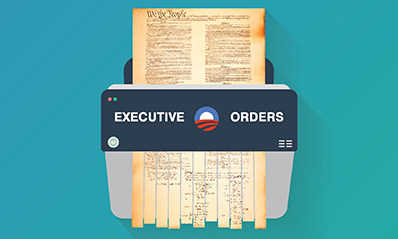Debate Overview
When the framers of the United States Constitution granted legislative authority to Congress, they envisioned it as the most powerful branch of the federal government. The constitutional role of the president, meanwhile, was to faithfully execute the instructions of Congress. The modern perception of the executive branch is quite different, however, with the head of state often appearing to be the nation’s most powerful policy maker. President Barack Obama certainly asserted his power when he acted unilaterally to defer deportation for millions of immigrants.
Setting aside whether the President’s actions represented good public policy, the fear is that a president who exercises legislative authority may be subverting separation of powers, which could set a dangerous precedent. On June 8, 2016, Intelligence Squared US, in partnership with the National Constitution Center, tackled this case and more, assembling a panel of experts to debate the motion, “The President Has Usurped the Constitutional Power of Congress.”
The Debaters
The panelists arguing in favor of the motion were Michael McConnell, professor and director of the Constitutional Law Center at Stanford Law School, and Carrie Severino, chief counsel and policy director of the Judicial Crisis Network.
Arguing against the motion were Adam Cox, a law professor at the New York University School of Law, and Eric Posner, law professor at the University of Chicago Law School.
The Research
The proponents of the motion alleged that, in granting lawful status to roughly 4 million aliens and deferring their deportations, not only was President Obama ignoring the congressional mandate on immigration, but he was changing the law by newly entitling a group of non-citizens to stay and work in the United States. Those arguing for the motion also brought forth the case of the Affordable Care Act, alleging that the president failed to enforce statutory deadlines by which employers were obliged to begin providing health insurance. Recognizing that these deadlines would not be met, rather than upset the business community by forcing compliance, President Obama acted to postpone them.
The opposition argued that Congress has, in the interest of solving problems that the legislative branch is not equipped to handle on its own, lawfully delegated increased authority to the executive branch, granting the president discretion in the details of policy enforcement. Because deporting all 11 million unlawful non-citizens was never fiscally feasible, the president deprioritized a selected group for deportation yet still advanced the goal of the immigration policy by continuing to deport more individuals per year than any preceding president. Likewise, in the case of the Affordable Care Act, President Obama adjusted and fine-tuned the details of the statute yet ultimately advanced its goal, indicating compliance and not usurpation.
Pre-Debate Poll Results
Prior to the debate, 29 percent of respondents voted for the motion, while 39 percent voted against, and 32 percent were undecided.
Post-Debate Poll Results
After the debate, 34 percent voted for the motion, indicating a 5 percent increase in support. 53 percent voted against, however, indicating a greater increase of 14 percent, thereby handing victory in the debate to the team arguing against the motion. The percentage of undecided respondents dropped to only 9 percent.
To watch or listen to the full IQ2US debate and participate in the online poll, visit: http://intelligencesquaredus.org/debates/past-debates/item/1530-the-president-has-usurped-the-constitutional-power-of-congress




